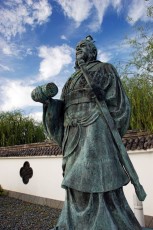Ep. 0074: The Western Way of War vs the Eastern Way of War

To begin laying some of the groundwork for the upcoming miniseries on the history of modern guerrilla and unconventional war, here’s a discussion of two different paradigms of what war is supposed to be and how it is supposed to be fought. One is the Western (or European) Way, which originated in Greece and from there filtered through the Romans to become the dominant paradigm among Westerners to this day. The other is the Eastern (or Asian) Way, which originated in China and from there filtered to other parts of the Asian world and beyond, and which forms the intellectual basis of much of modern guerrilla tactics and strategy.
Join CJ as he discusses:
- The origins of the Western Way and how it has evolved over the centuries
- The origins of the Eastern Way and how it has evolved over the centuries
- Why this matters to understanding the modern world in general, and the history of modern unconventional warfare in particular
Please consider becoming a Patreon patron of the DHP!
External Links
- The ZeroGov forum
- Bruce Lee, “The Art of Fighting Without Fighting” (Note the parallels to Sun Tzu’s description of the skillful general)
I think generally the Romans would still be considered Western, and not just for geographical reasons. They certainly brought more sophistication to war than the ancient Greeks did, and there were generals (such as Fabius Maximus) who approached war in a somewhat similar fashion to Sun Tzu.
However, I think that most Roman commanders and soldiers still conceived of war as primarily being focused around the idea of winning wars via decisive battles, and those were to be won primarily by a combination of superior hardware and superior discipline/training/cohesion.
I admit I somewhat simplified Hanson’s portrayal of the WWoW here for the sake of time. I wanted to get across its origins and essence. I somewhat glossed over its evolution post-5th century BC. In books such as Carnage and Culture, for example, Hanson traces his idea of the WWoW forward in time, and fleshes out what he believes are its characteristics in much greater detail. (Not saying I necessarily agree with everything he says, of course, but it gives a fuller picture of what he and others of a similar mind on the matter mean when they use such terms.)
I have to admit I am skeptical of the concept of an “Eastern Way of War” and “Western Way of War”. I still stick more with the terms “Conventional War” and “Guerilla War” because I don’t see them as being regional. For example, India during the Mauryan Empire period had a heavy focus on set piece decisive battle thinking and was an Eastern group of kingdoms. Furthermore if you look at the Japanese invasion of Korea in the 16th century you see Japan engaging in large scale conventional tactics with the Koreans engaging the more asymmetrical method of conflict. I think any large or frequently successful nation state – particularly states with a professional “warrior class” will inherently gravitate toward what you call the “western way of war” while any weaker nation contending with larger adversaries will gravitate toward “eastern”. It’s just a natural occurrence. Large nations with large professional armies prefer western because that is their inherent strength whereas smaller weaker states prefer eastern for the same reason. It’s not culture or geography, just pragmatism.